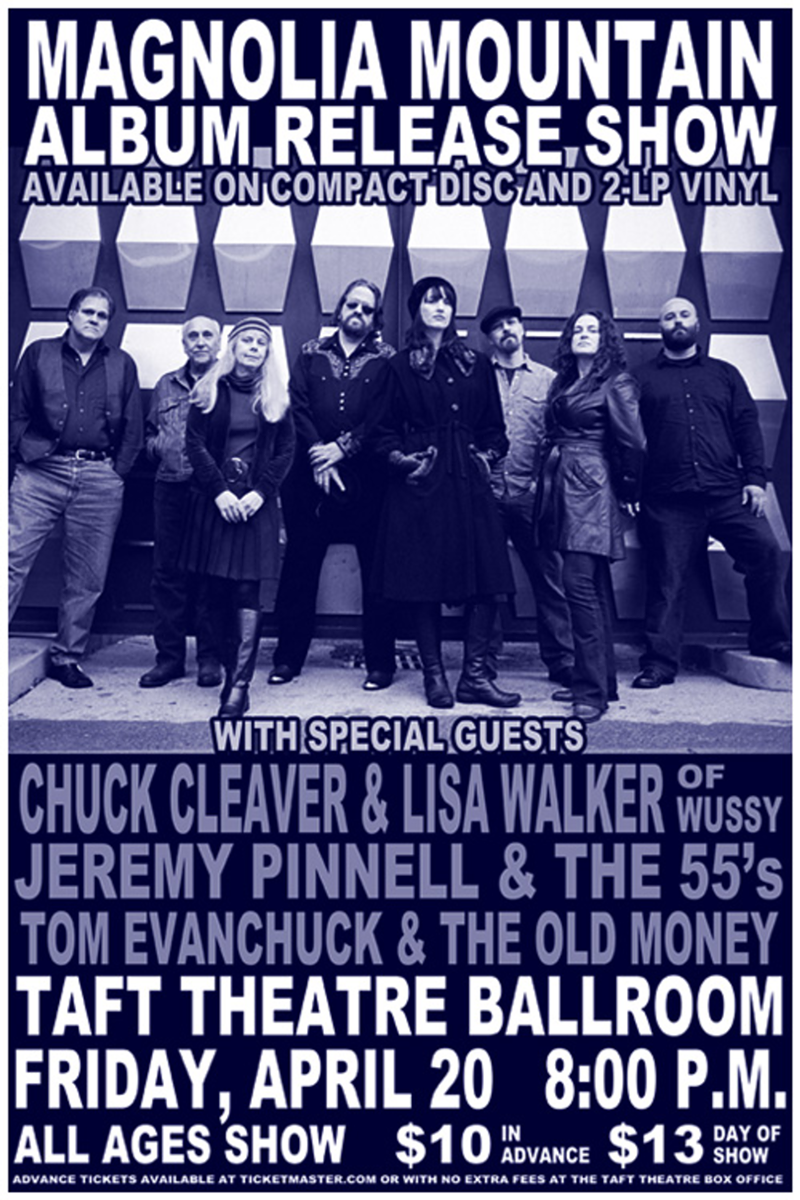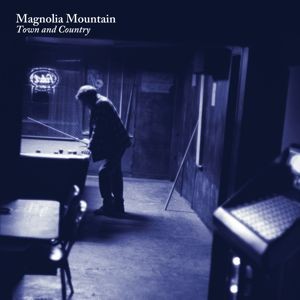This Friday night, Cincinnati's finest Americana outfit, Magnolia Mountain is set to celebrate the release of its fantastic new LP, Town and Country, easily one of the best locally-produced albums of the year. Frontman Mark Utley and his bandmates will party in Town and Country's honor by performing tomorrow at the Ballroom at the Taft Theatre. The all-ages show kicks off at 8 p.m. with guests Jeremy Pinnell and the 55's, Chuck Evanchuck and the Old Money and Chuck Cleaver and Lisa Walker from Wussy performing a duo set.
Click here to read this week's CityBeat feature on Magnolia Mountain. Below is the full interview with Utley.
CityBeat: Tell me about the new album. What was your mindset going into it — did you have a good sense of what you wanted to do right away? Did it end up as you planned?
Mark Utley: I think the goal with all the Magnolia Mountain records has been to document where we were as a band and where I was as a songwriter at those specific times. The two years since we released Redbird Green have been a real rollercoaster ride for me personally — really high highs and very low lows — and I think that shows up in the songs. I tend to write fairly literally. It was a difficult record to make but it feels great to have made it. They’re the best songs I’ve ever written and it’s the best record we’ve made yet.
We didn’t do a Magnolia Mountain album in 2011, mostly because of how long (the benefit project) Music for the Mountains took to put together. So we had a ton of songs written and I was anxious to get back in the studio. I wanted to expand on what we did on Redbird Green in almost opposing directions. The song “Hellbound Train” from that record was a huge audience favorite, but it wasn’t really like any other song on that album. So I wanted to write some more in that direction, but I was also writing songs on the banjo where it seemed like all I wanted to do was keep stripping things off until I got to the bare essence of them.
CB: What's the significance of calling the album "Town and Country"?
MU: It’s a nod to that dichotomy, the rockier stuff set right alongside the folkier songs. It’s interesting to me, because the original template for this band was something along the lines of Neil Young’s Live Rust record, where we would start out a show almost whisper-soft with folky acoustic stuff, and by the end of the night we’d be playing riff-heavy rock songs on electric guitars. But the earlier MM lineups didn’t have all of that in them. This lineup does, and I love it.
CB: You mentioned that you had at least a twinge of concern that perhaps Town and Country was almost too varied. That's something I've always loved about Magnolia Mountain, yet it annoys me sometimes when other bands do it. I think the key is you have the ability to make it still sound like Magnolia Mountain; you never lose context when you're listening. Is it fair to say you had those concerns?
MU: I don’t think I was afraid it would be too varied, but I did (and do) have concerns that the record might alienate some earlier fans by incorporating too many different styles and sounds. But I’m hoping that other people will feel like you do, that it all still feels like part of a legitimate whole. Because I don’t write in different styles as some sort of genre exercise, I write like this because all these styles of music are just part of what I love and who I am.
Patterson Hood of Drive-By Truckers made a name for himself and his band by exploring “The Southern Thing,” meaning all the contradictions and the dynamic of growing up in the modern South and how other people see that and how you see yourself. Well, it hit me a while ago that so much of the music that gets termed “Americana” or “AltCountry” or whatever, is kind of “The Midwestern Thing.”
I mean, think about it, I grew up in southern Indiana and I’ve lived here in southern Ohio for over 20 years. We’re on the border of north and south, our ears hear a mixture of Rock and Pop and Country and R&B every day growing up. We hear phrases like “world’s biggest small town” tossed out as compliments and as urban as we try to be sometimes, our backgrounds are often very blue collar, very working man, very rural, even.
I think Magnolia Mountain is very much about all that, and I couldn’t be prouder of it.
CB: This one will be on vinyl as well, correct? What's with your dedication to the vinyl release? Do you personally feel your own music sounds better on vinyl than, say, a CD or digital file?
MU: I think pretty much everything sounds better on vinyl. I’m so happy vinyl records are coming back and I’m on cloud nine that all three of our records are available in that format. There’s nothing like that sound, that feel of the album in your hands, dropping the needle in the groove and looking at the artwork and the liner notes while you listen. It’s a ritual. It’s magic.
MU: It kind of depends on if they have any grasp at all. I usually start with words like “rootsy” or “Americana” and if their eyes gloss over I’ll default to “Folk” or “Country." Or change the subject. I accepted long ago that the vast majority of the population doesn’t live or die by music the way I always have, so I don’t hold it against people for not catching obscure musical references or being well-versed in sub-genres. I’m just trying to find words or chords that people respond to no matter what their musical pedigree.
CB: Do you often say you play Country music, or is it just not worth the hassle of explaining that it's not THAT kind of Country music?
MU: I do use the term, although sparingly, and usually with a lot of hyphens. A lot of people associate Country music with a laundry list of negative connotations, and sometimes you can’t overcome that. But that’s kind of their problem and I try not to make it mine.
As far as the curse of “New Country,” yeah, I hate most of it as much as the next guy, but I also know that a lot of people listen to it because they don’t really have the time or the inclination to dig any deeper. But I also think that most people, no matter what their background or their musical preconceptions, tend to recognize honesty, real emotion, and lack of bullshit when it’s presented to them and that’s what I want to present to an audience.
CB: So how many musicians are currently in Magnolia Mountain? It seems you have had a fairly steady revolving door of co-players in the group with you, though, again, there's never a huge difference from lineup to lineup. Tell me a bit about who you’re playing with now?
MU: We’re still at eight, where we’ve been for a long time, but there are four new faces joining four original members in the Town and Country line-up: Renee Frye on vocals, Jeff Vanover on guitar, Todd Drake on drums, and Kathy Woods on fiddle, joining me, vocalist Melissa English, bassist Bob Donisi, and Bob Lese on mandolin and harmonica. All four of the new folks came in at roughly the same time, and fortuitously enough, right at the beginning of the Town and Country recording sessions, so they all had the opportunity to put their stamp on the record, and boy, did they ever.
I couldn’t be happier with how they’ve all worked out. They’re such incredible players and singers and great people to know and spend time with. For whatever reason, this version of the band feels the most comfortable in its own skin and I love that. The audiences seem to sense it, too. The new stuff is going over great live.
CB: How do rehearsals work? How frequently do you all get together? it would seem to be a logistical headache, at the very least.
MU: We rehearse once a week at my palatial Price Hill estate. We move the dining room table out of the room and set up in a circle. Some of us amplified, some of us not. It’s pretty low key, kids and dogs and cats coming and going. Usually everybody’s there every week. That’s how we learn so many new songs all the time, originals and covers. The process never really stops.
CB: The video for “The Hand of Man” and the Music For the Mountains benefit compilation have gotten the band and the cause of stopping mountaintop removal mining a lot of attention. Do you have more plans related to that or another cause in the works?
MM: Assuming the new location of the Southgate House is up and running by then, I’d like to do another multi-artist “Music for the Mountains” benefit concert in the fall. I don’t have the energy for another compilation album right now, but maybe down the road. The bad guys don’t sleep, you know, and neither can we. It’s just my little thing that I feel like I can do to help the folks that fight it day in, day out.
CB: Why was it important to you to become involved with the mountaintop mining campaign? Did the success the music had on getting the cause more attention give you a new perspective of the power of music?
MM: It just hit me as wrong on every conceivable level. It’s environmentally wrong, horribly short-sighted, and what it’s done to the residents of those areas is nothing short of criminal. It amazes me how well the coal companies have been able to use their corporate, political and financial muscle to hide it or dance around it for so long.
I do generally find, though, that once people become aware of what’s happening, either through a book or a speaker or a song, that they want it to stop, and that’s encouraging.
CB: The way people make and share and listen to music has changed a ton since your days with (Utley's late ’80s AltRock band) Stop the Car. Do you think Stop the Car would have been able to take things further if they had the resources you have now?
MU: Yeah, I do. For a couple of years there, at least, I would’ve put (Stop the Car) up against anybody, but we were so isolated back then, living in southern Indiana. It felt like we were playing in a vacuum. The kind of connections that the internet made possible were unheard of back then. I’m very thankful to have them now.
CB: When did you start listening to roots and Americana music, and start becoming a serious fan?
It was incremental. My dad listened to what you’d now call classic Country when I was growing up, but I couldn’t change the station quick enough. I’ve always been one to seek out the heroes of my heroes, though, and through bands like X, I started digging through older American Country and folk music. Hank Williams hooked me immediately. Woody Guthrie. Lead Belly. The Carter Family. You go deeper and deeper and deeper. It just never stops.
CB: What do you make of the (for lack of a better word) "trend" of a lot of musicians who would have fronted Punk Rock or Metal bands 10 years ago turning instead to Folk and Roots music these days? What do you think the draw is, particular to our times? Or do you think it's because kids are exposed to so many different styles nowadays?
MU: Well, they say that religion is the last refuge of a scoundrel, but perhaps it’s really Country music.
I don’t know, really, other than the fact that people can sense the authenticity of some of this music and perhaps they want to discover it more deeply, or co-opt it to their own ends, or try it on like a new suit of clothes. Whatever it is, and however the trends cycle in and out, I think people can tell who plays these kinds of music because it’s part of them and who’s just trying on the suit.
CB: Along those same lines, what do you think it is about American roots music that has given it such a fervent fan base overseas?That cult following for Americana in Europe and elsewhere seems to have been going strong for a long time now. I'm sure you've probably had more than a few nice reviews from the "foreign press."
MU: Europeans have always had an insatiable appetite for American musical forms. The British Invasion was nothing but them taking our music, making it their own and shooting it back at us.
Again, there’s the attraction of a sense of an authenticity, of something foreign and exotic, of times and places and people either long gone or vanishing inexorably. Our world is getting more and more controlled, more homogenized, more corporate, soulless and these Roots music forms are the antithesis of that.
CB: What's next up for the group? Is touring a possibility? Have you done radio campaigns and things like that in the past? Shopped music for licensing?
MU: We recently signed with a digital label from down south called This is American Music (TIAM). They’ll be handling the digital sales for all three of our records and we’ve contracted them to do promotion for Town and Country, as well. So we’ll finally have someone to take what we do and try and get it in front of people, which we’ve never had before.
We’re also working with a booking agent out of Nashville who’s setting up some tour dates for us, and we’ll be doing some trade off gigs with some of the other TIAM bands. It’s difficult with the size of our group, but we’re going to go out on the road as much as we can. I’m also doing more stripped-down gigs with Renee and Jeff as a trio, and we’re looking at touring with that configuration as well.







